[ad_1]
The unsung hero of many kitchens is the dishwasher—a true god-send for keeping crockery, drinkware, and cutlery gleaming. So how can you ensure your dishwasher itself is in a squeaky-clean condition? Easy. Just follow our simple step-by-step guide for how to clean a dishwasher, approved by the experts.
When cleaning a kitchen, the dishwasher is an easy element to miss, as many of us might assume that a dishwasher cleans itself. However, the reality is a little different, and your dishwasher needs care and attention just as you would clean a fridge or the sink.
Build-ups of grease and limescale in your dishwasher can not only result in unpleasant odors, but they can also potentially damage your machine in the long run. Heather Barrigan, a cleaning expert at MyJobQuote.co.uk, explains, “Regular cleaning will not only ensure your dishwasher is thoroughly clean but will also allow the machine to last for longer,” she said.
Not only that, but dirt and build-up can also limit your dishwasher’s effectiveness, meaning those dirty dishes could actually be far from polished when they emerge. So here’s how to clean a dishwasher effectively, including the tools and ingredients to avoid, and the easy (and natural) trick for tackling bad smells.
How to clean a dishwasher in four simple steps
Done regularly, cleaning your dishwasher shouldn’t take you longer than around 15 minutes when following the steps below—just be sure you have the right tools to hand, including kitchen paper, dishwasher salt, vinegar and baking soda.
1. Clear any food debris
It may sound like an obvious ask, but be sure to remove any food debris that may be lingering before properly cleaning your dishwasher. Skipping this step can mean that you’re simply cleaning around bits of food that haven’t been sent down the drain—which will only result in a lingering odor and a machine that isn’t cleaning at its best.
First, remove any clean items that are left in the dishwasher. Then, all you need to do is run a piece of kitchen paper around each part of your dishwasher, including the base, the spray arms, the trays themselves and the sides, picking up any bits of food. Don’t worry about any stuck-on food particles; these will be addressed later on in the process of how to clean a dishwasher.
2. Use dishwasher salt in the funnel
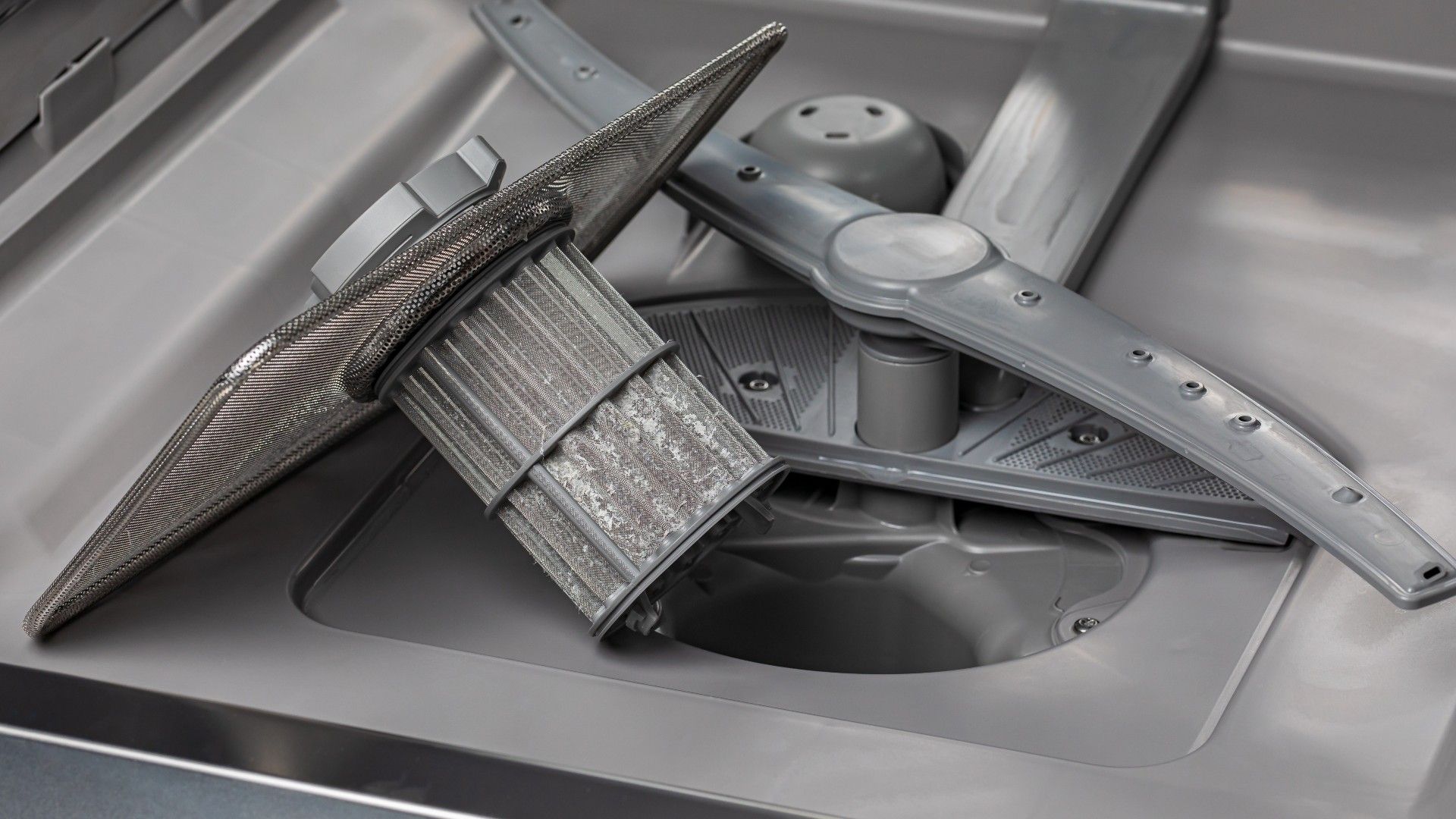
(Image credit: Getty Images)
Dishwasher salt is something we should all be using regularly to clean our machines—it’ll help to break down any limescale, and also ensure that your dishwasher actually cleans your dishes and cutlery more efficiently, too.
“This should be poured into the funnel until it’s filled to the top,” advises Heather. “Using dishwasher salt is the perfect hack for a quick clean, as it allows you to wash your dishes at the same time.”
Dishwasher salt will be available to buy in your local grocery store or online. And it probably goes without saying, but you need to buy the specialized stuff—sea salt used for cooking is absolutely not the same in this instance!
3. Clean the drain trap of the dishwasher
The drain trap and filter area of your machine are likely to unwillingly play host to food waste, so it’s essential that they get a clean during this process. And luckily, removing blockages if they do exist is relatively straightforward.
“Remove the bottom rack and unscrew the drain filter,” explains Heather. “You can use a wire hanger to retrieve any sort of clog or blockage. You can then further loosen more stubborn obstructions by pouring a tablespoon of baking soda and two tablespoons of vinegar down the drain. This should be left for 10-15 minutes before rinsing it with hot water and putting the parts back.”
4. Use baking powder to clean the inside of your machine
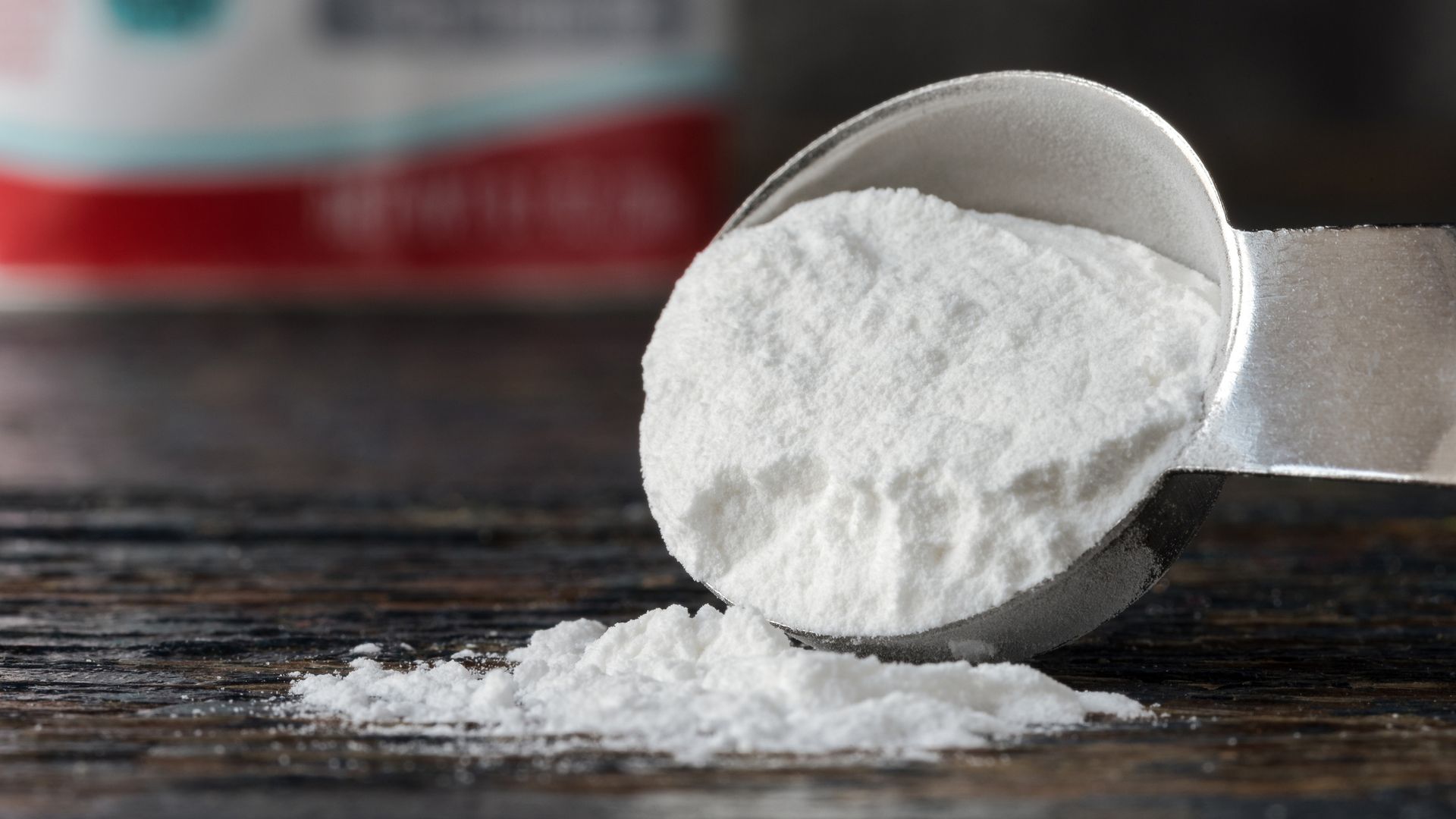
(Image credit: Getty Images)
Finally, sprinkle a mug of baking powder along the base of your dishwasher. Then, set it to run on a hot cycle. The baking powder’s alkaline properties mean it can not only shift residue but can also eliminate odors, and generally fight against any lingering bacteria.
Baking soda is very versatile and also a failsafe kitchen staple if you want to know how to clean a stovetop, or how to clean copper, too.
Once you’ve finished cleaning your dishwasher, leave the door ajar to give it a chance to air. In fact, this is a good tip to follow after every washing cycle—leaving the door open for at least an hour will help to expel any lingering moisture, which can, over time, cause a build-up of mold.
How do I do a deep clean on my dishwasher—and can I use vinegar to clean my dishwasher?
The above method should be sufficient when planning how to clean a dishwasher, but if you want to really get into all of the nooks and crannies, and have a bit more time to spare, there are a few extra tricks you can employ for a deep clean.
Cleaning expert Muffetta Krueger, founder of Muffetta’s Domestic Assistants, explains that all you need for an extra thorough clean is white vinegar, using a method that is surprisingly easy and effective.
“To perform a deep clean on your dishwasher, start by emptying the dishwasher completely. Then, place a dishwasher-safe cup filled with white vinegar on the top rack and run a hot water cycle. This helps remove grease, odors, and mineral deposits.”
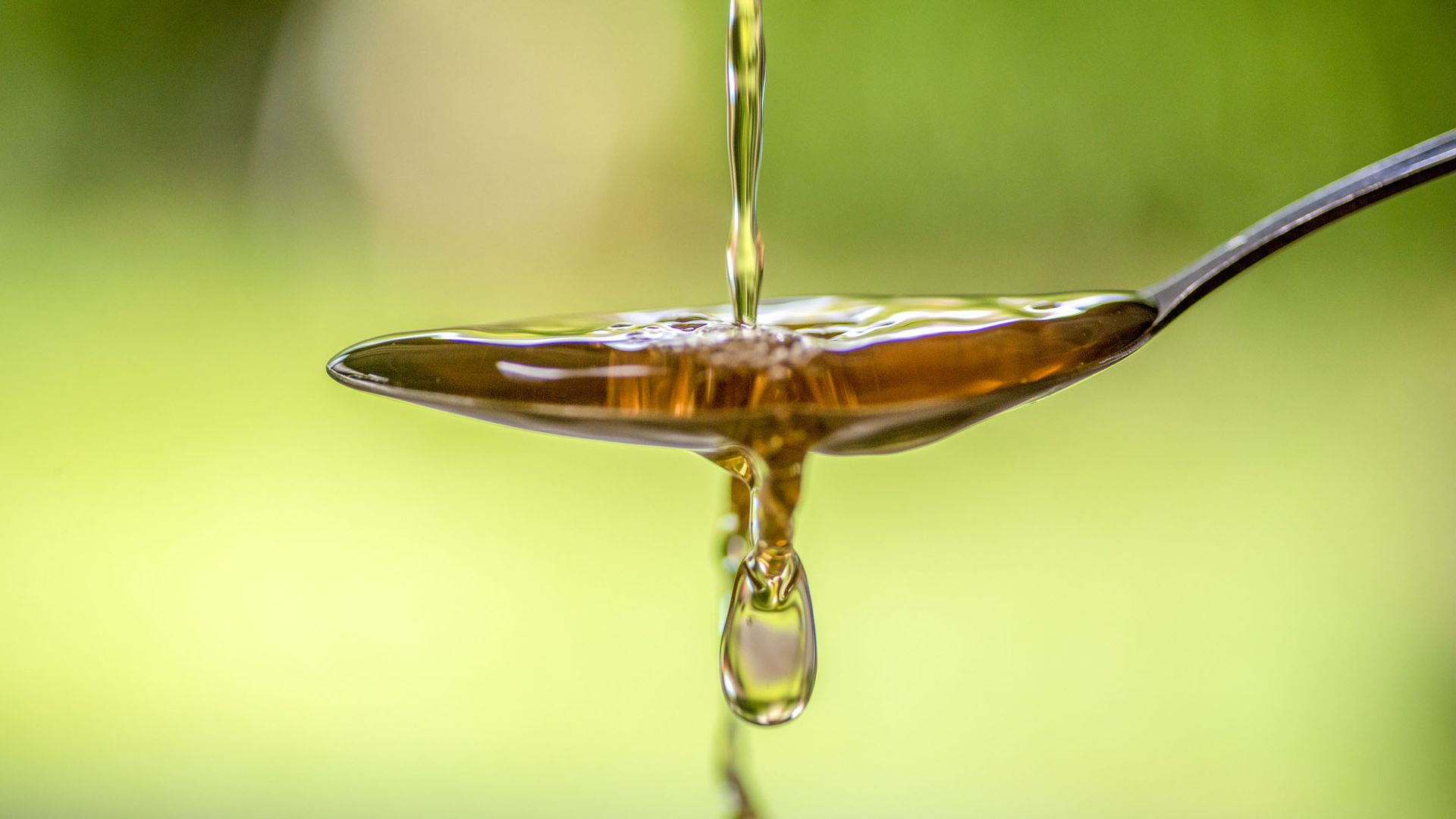
(Image credit: Getty Images)
The hot vinegar should help loosen any grime accumulated within the dishwasher, with its acidic attributes making it a breeze for you to wipe a sponge around the inside of the machine and shift the unwanted debris.
Heather adds, “The only downside is the smell, which can linger.” If you want to mask the acidic scent, feel free to add in a few drops of essential oil such as orange, or lemon.
After this, you can still sprinkle baking soda into your machine and run another hot water cycle—and doing both will ensure that your dishwasher is squeaky clean.
If you prefer, store-bought cleaners created for dishwashers are also a great option for a deep clean. Cleaning expert Laura Mountford, of Lauracleanaholic, said, “Deep clean your dishwasher monthly using a dishwasher cleaner. Simply add the cleaner to a hot empty cycle, as you would with vinegar.”
What is the best way to clean and deodorize a dishwasher?
Odors can be a particularly pesky problem when it comes to our dishwashers, so cleaning with a focus on eliminating that problem is important. To deodorize your dishwasher as best you can, you’ll need to direct your attentions to the areas that are likely to harbor the most food debris and bacteria.
“The key areas that require special attention when cleaning a dishwasher are the filter, spray arms, and the door gasket,” Muffetta said. “If your dishwasher has an unpleasant smell, you can tackle it by first checking and cleaning these areas.”
“The filter collects food particles and debris, so it should be removed and rinsed under running water regularly. The spray arms can also get clogged, so it’s important to clean the nozzles and ensure proper water flow. The door gasket should be wiped down with a damp cloth to remove any residue that can cause leaks or odors,” she explained.
If you can’t see an issue with these areas specifically, using vinegar on the dishwasher as a whole regularly, as suggested above, can also help to tackle smells.
How often should I clean my dishwasher?
Generally speaking, you should clean your dishwasher as and when you clean other items in your home like your washing machine or blinds—every one to three months is sufficient to ensure it remains in good condition. But if it is producing bad odors or simply looks dirty, you’ll probably want to act sooner.
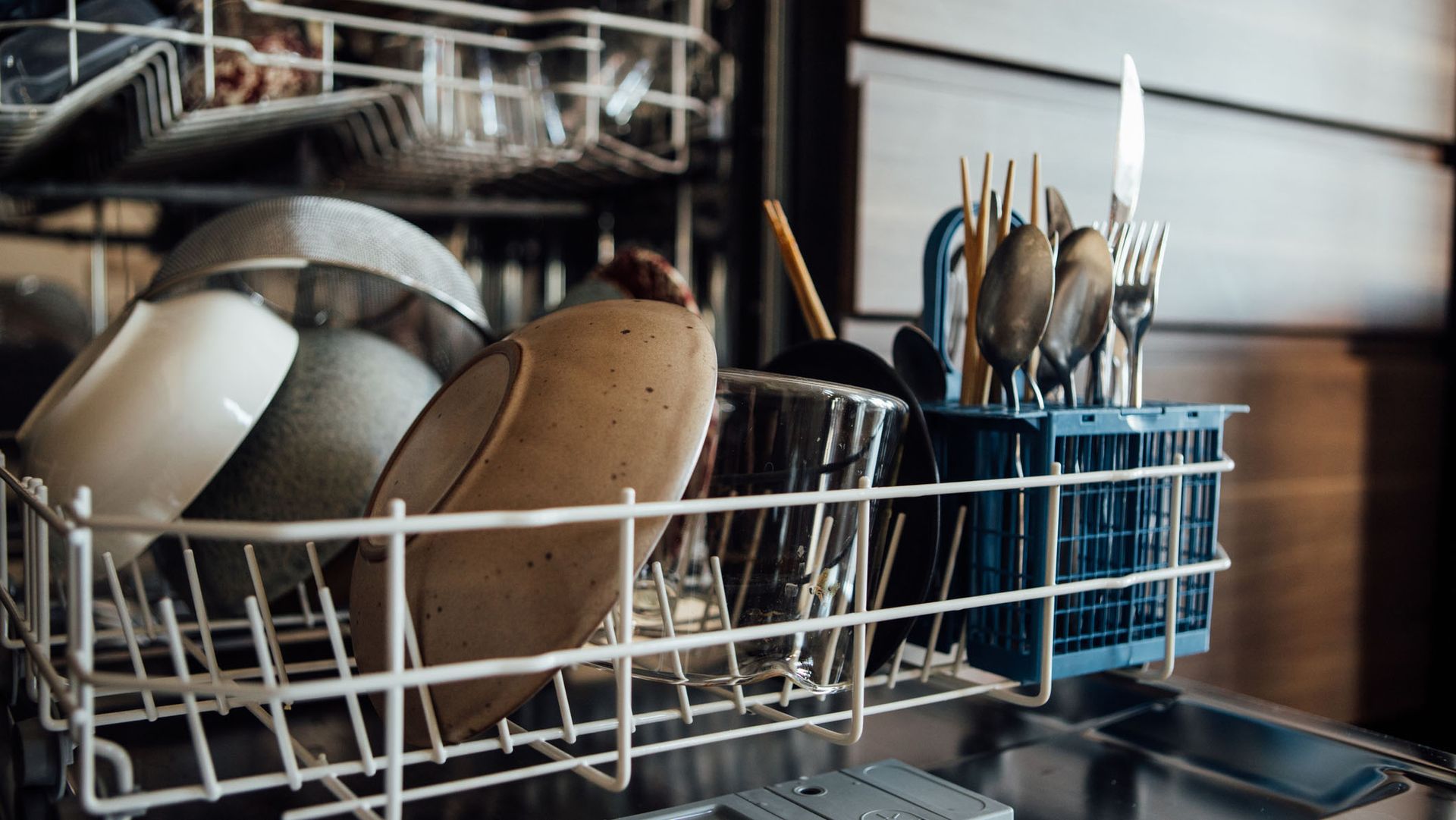
(Image credit: Getty Images)
Other tell-tale signs that your dishwasher is in desperate need of attention include items coming out with stains or traces of food still on them, a noticeable odor, as well as a build-up of residue on the inside of the door.
Though a thorough clean should be done every month, or every few months, Laura advised that there are a few quick habits you can do daily and weekly that should keep your machine in good shape on an ongoing basis—and to assist with a deep clean.
“Get into the habit of removing food debris from the bottom of your dishwasher on a daily basis,” she suggested. “And on a weekly basis, try and clean the filter (by removing it and scrubbing in a bowl of warm soapy water), the seal and wipe down the edges of the door.
“Wipe down the seal and edges of the door using an antibacterial spray—and don’t forget to top up the dishwasher salt and rinse aid regularly too.”
Key areas to focus on when washing your dishwasher
When cleaning your dishwasher, it’s important to focus on the key areas most likely to attract grease, limescale, and food, as mentioned. Though you’re likely to tackle the below areas when cleaning your machine generally, you’ll want to really make sure these spots are on your checklist and don’t get missed:
- The rubber seals: Detritus can easily gather in the delicate seals around the door of your dishwasher. Be careful when cleaning them; use a soft sponge or an old toothbrush to give them a gentle yet thorough clean.
- The filter: This is where food and gunk are most likely to congregate, so regular cleaning is essential to ensure the well-running of your machine as well as limiting the risk of bad smells. Most dishwasher filters are detachable, meaning you can remove the filter from the machine for fuss-free cleaning. As suggested, warm soapy water should do the trick.
- The spray arms: These can all too easily become obstructed by pieces of food, so paying attention to them is important. If you can easily detach them, take them out and soak them in white vinegar to remove any grease or limescale build-up.
- The exterior of the machine: Don’t forget to include the front, top, and sides of your machine in your cleaning routine, too. This can be cleaned with either an anti-bacterial spray, or a mixture of water and vinegar in a spray bottle.
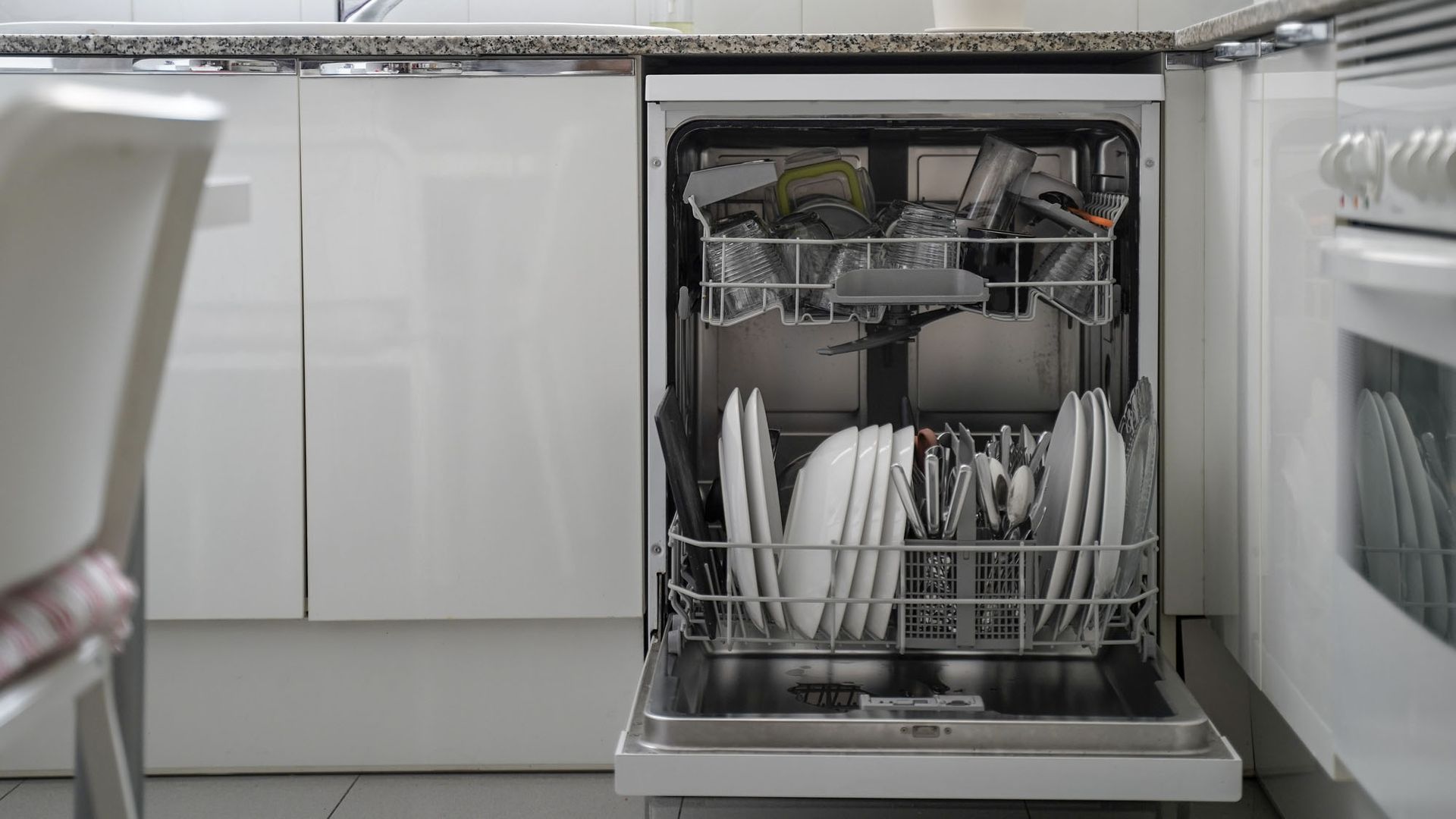
(Image credit: Getty Images)
Products to avoid cleaning your dishwasher with
You’ll want to be careful when it comes to bleach products, which is one of the most common dishwasher mistakes you’ll want to avoid. While they might feel like an obvious choice for helping to limit the growth of bacteria and keep your dishwasher clean, bleach can have a damaging impact on machines with stainless steel interiors. This is the same for other kitchen appliances, too, such as your best blender or your best food processor.
Laura also advised staying away from more abrasive cleaning products and agents, such as scourers, “as these can damage and scratch the inside of the machine.” She also suggests staying away from products that are highly fragranced, as this can penetrate into your dishes, pans and cutlery, which isn’t ideal.
[ad_2]
Source link